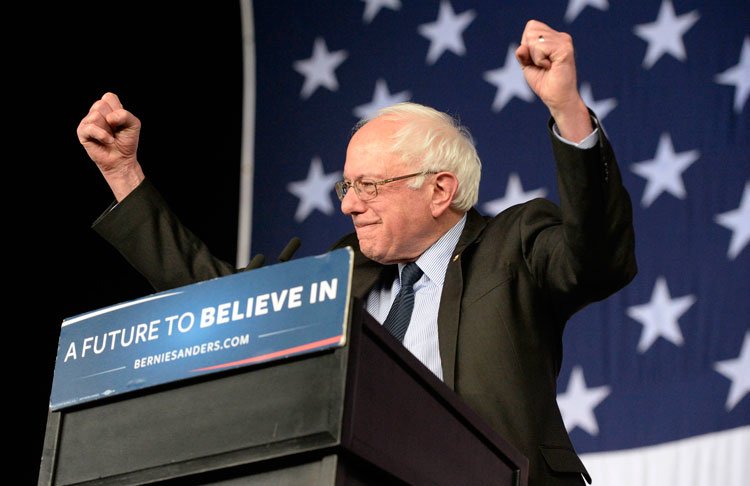
When Sen. Bernie Sanders announced his campaign for the presidency last April he was immediately dismissed by the mainstream media as a total long shot. In a Washington Post profile on the senator, he was described as “an unlikely presidential candidate — an ex-hippie, septuagenarian socialist from the liberal reaches of Vermont.” Whereas the campaign announcements of Hillary Clinton, Donald Trump and Sen. Ted Cruz made the front page of the New York Times, Sanders’ bid for the presidency was on page 21.
That dismissive media coverage has been continually problematic throughout his grassroots campaign. Even as the Sanders campaign broke fundraising records and his rallies continued to draw in massive crowds, political pundits rejected the notion that the self-proclaimed Democratic Socialist had any chance of defeating Clinton and winning the Democratic presidential nomination.
One particularly problematic narrative in the media is that Sanders is hopeless when it comes to minority voters. Clinton, who has basically universal name recognition and a loyal following of Democratic minority voters in the South, was expected to dominate in all of the country’s most diverse states. This was proven entirely false after Sanders won by a large margin on “Western Sunday” in three of the country’s most diverse states: Alaska, Washington and Hawaii.
Frustrated with the widespread assumptions that Sanders does not fare well with voters of color, many of his minority supporters took to Twitter with the hashtag #BernieMadeMeWhite. The tweets were generally humorous, such as @welknett, an African-American woman, tweeting a picture of herself next to a white woman with the caption “This isn’t a picture of two best friends, it’s actually a before and after voting for Bernie pic. #berniemademewhite.”
While the trending hashtag used humor to highlight the false perceptions of Sanders’ inability to attract the always-coveted minority vote, #BernieMadeMeWhite highlighted an even bigger issue: the media’s tendency to make predictions instead of covering where candidates are actually getting support at the grassroots level.
Media outlets continually express utter shock when Sanders wins in key states such as Michigan, but generally ignore when he performs better than expected, such as when Clinton won the Democratic primary by less than 2 percent in her home state of Illinois.
In an MSNBC Live panel discussing media coverage of Sanders, Progressive Magazine’s Ruth Conniff acknowleged the widespread dismissal of Sanders by the media and powers within the Democratic party.
“You know, you see the party, a lot of the elected and a lot of the party officials trying to push for viewing Hillary as the nominee,” Conniff said. “Now that’s not really happening. He’s picking up steam now with these big victories, the margin of the victory, the enthusiasm for him, the number of young voters who overwhelmingly prefer him. I mean, all of that he’s trying to make the case is carrying him forward all the way to the convention. And I think there’s no reason at this point to believe he won’t go all the way to the convention.”
Conner Pierce, a 22-year-old Lakeview resident and vocal Sanders supporter, remains as optimistic as Conniff despite the senator’s struggle to be viewed as a legitimate candidate by the mainstream media.
“Honestly, it almost seems like his lack of coverage via large media has done more to motivate young voters, who receive most of their political information through the Internet, to become more active politically,” Pierce said. “People can see the bullshit for what it is, and his campaign has done a lot to illuminate the things that need to be changed.”







